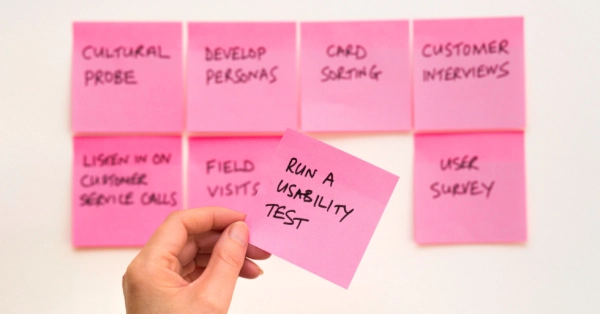When you want to test your business idea, it's important to ask the right questions to the right people. It is important to formulate them as such, but only after you have established very clearly what you actually want to find out from them. In the following material you will learn how you can cover all these criteria:

Regardless of the stage your business is in, customer feedback is very important to how you develop or improve your product. If you're just starting out, the feedback you get from those who have used your product may show you that you're going in the wrong direction, for example (i.e. it doesn't validate the problem you thought you'd identified). If you already have customers and sales, you can find out what makes people quit using your product, how you can improve it or identify other lines of business.
But before you can get relevant answers, you need to find the right questions for your assumptions. So where do you start when formulating them? Here are some ideas and examples to help you.
Who to ask
-
Even if the first idea that pops into your mind is to ask your family and friends, pay attention to the information you receive from them. The feedback they give may be vague or positive because of the personal relationship you have with them. And if you decide to ask them anyway, the questions you ask must be formulated well enough to allow then to offer a relevant answer.
-
Get out of your bubble - ask people who are not related to your company and don't know your product yet. And if you want to find out if you are heading in the right direction, talk to people you think would be in your target (people who would theoretically use the product). They can come up with insights that you wouldn't have thought of up to that point.
-
A mentor or an investor, for example, cannot "validate" your assumptions. But if you want to receive an investment, you must be able to prove that you have obtained product validation.
How to ask
-
Before you ask, be clear on what you want to know: the issues around topic x, the needs of the customers, etc. And only then formulate the questions.
-
Before asking for feedback about the functionality/value your product would bring, find out what the habits, behaviors and problems of your potential customers are.
-
Don't lead the witness
-
Avoid questions that include the answer ("You find this very interesting, right?"). Ask the questions in a way that allows you to find out what the customer actually thinks, not to confirm your assumptions (although it helps when that happens :) ).
-
Don't interrupt the person who is answering to ask other questions (let them finish their thoughts)
-
Use the silence - pauses help people organize their ideas, do not interrupt them. Give people the space they need to answer.
-
What to look for, besides the actual answer
-
Rob Fitzpatrick, author of The Mom Test , says that it's also important to see what kind of emotions the topic stirs up in the conversation with your customers (were they angry, was there something that amused them or made them happy, etc.). Do they compare your product to other products out there (even if not in your industry)? Write them down and see what they have in common.
Examples of properly formulated questions that can help you when asking for feedback:
1. What has been your experience so far trying to [need met by service/product]? What was your experience when you use products/services of type x? (avoid asking directly about how important the customer thinks the benefits you have formulated are. You start by seeing if those benefits exist in the customer’s mind in the first place).
2. How did you manage the situation/what resources or tools did you use to overcome the problem? What were the steps, how did you feel, who did you turn to then?
3. What exactly did you need/what do you think would have helped you when you faced [problem identified by the customer]
4. How does [identified problem] affect you - how much is really costs you?
When you talk to people who have already used your product:
5. How did you start using our product/service?
6. Why did you chose us?
7. What other things would help you have a better experience when using our product/service?
8. Why did you stopped using our product/service? (for those who quit along the way)
Put it into practice!
Make a list of questions for those you need feedback from, using the examples below!
LIST OF EXAMPLES
Questions for relevant feedback
How do you formulate them correctly?
Bonus: How to ask questions internally when you spot a problem
The 5 "whys" help you figure out where the problem you identified started. Usually, from a seemingly technical problem (like the example in the video), you can end up spotting a human error or gap in your internal processes.
Remember that feedback (and its analysis) should always be a part of your sales/testing process, no matter what stage you are at. It's an important part of the "annual medical checkup" that your startup needs.
List of additional resources:
-
The Mom Test - Concretely, this will teach you what the steps to follow when you want to lay the foundations of a product are, how to properly ask for feedback and what to do with the insight received from your potential customers.
-
Mapping Customer Experiences - How to turn valuable customer observations into actionable insight.
Tools you can use
Given that it is much more difficult to physically reach your potential customers during this period, it is important to remember that you still have online tools at hand to help you:
-
Tools for online surveys: Google Forms, Microsoft Forms, Survey Monkey, Typeform etc.
-
Tools for online interviews : Zoom, Google hangouts, Microsoft Teams etc.
Some of them are free, others offer only certain functionalities for free or have limits regarding the number of questions/participants or answers received.















